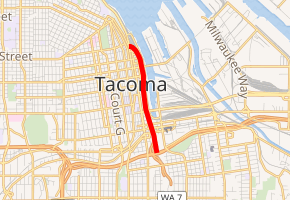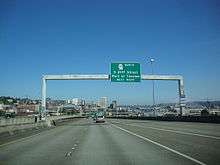Interstate 705
Interstate 705 (I-705, Tacoma Spur[2]) is a short Interstate Highway that is spur route of I-5 located entirely within Tacoma, Washington, United States. I-705 serves as the connector between I-5, Downtown Tacoma, Tacoma's waterfront, North Tacoma, and the Tacoma Dome. I-705 was the last new portion of the Interstate Highway System to be constructed in Washington, having opened in 1988.
| ||||
|---|---|---|---|---|
| Tacoma Spur | ||||

I-705 highlighted in red | ||||
| Route information | ||||
| Auxiliary route of I-5 | ||||
| Defined by RCW 47.17.819 | ||||
| Maintained by WSDOT | ||||
| Length | 1.50 mi[1] (2.41 km) | |||
| Existed | 1988–present | |||
| History | Codified into law in 1979 | |||
| Major junctions | ||||
| South end | ||||
| North end | Schuster Parkway in Tacoma | |||
| Location | ||||
| Counties | Pierce | |||
| Highway system | ||||
| ||||
Route description
The Tacoma Spur begins as a continuation of State Route 7 (SR 7) underneath I-5 in Tacoma, and has a posted speed limit of 60 miles per hour (97 km/h) for the entire length (1.5 mi, 2.4 km).[1]
Traveling northbound as a continuation of SR 7, the first exit is for South 26th Street, which provides access to the Tacoma Dome, and the Tacoma Dome transit hub and Amtrak station. A single-point urban interchange (SPUI) with SR 509 (South 21st Street) provides access to the University of Washington Tacoma campus, as well as the Port of Tacoma via the East 21st Street Bridge. The left two lanes of I-705 separate, providing access to A Street, as well as South 15th Street / Pacific Avenue, however travelers merging onto northbound I-705 can not access this exit. The Bridge of Glass, linking the Museum of Glass on the shorefront to downtown Tacoma, passes over I-705 as it continues north, paralleling the Thea Foss Waterway to the east, and Firemans Park to the west. A signalled at-grade intersection with Stadium Way marks the end of I-705 northbound.[3]
Traveling southbound towards I-5, I-705 begins with on ramps from Stadium Way South and from Schuster Parkway. Passing Firemans Park on the south, traffic from South 9th Street and A Street merge onto I-705. Traffic coming from Bates Technical College and South 13th Street join the freeway, as well as traffic from South A Street. A SPUI with SR 509 (South 21st Street) is the only exit in Tacoma, before either exiting onto I-5 southbound towards Portland, Oregon, I-5 northbound towards Seattle and Vancouver, British Columbia, or onto SR 7.[4]
Every year the Washington State Department of Transportation (WSDOT) conducts a series of surveys on its highways in the state to measure traffic volume. This is expressed in terms of annual average daily traffic (AADT), which is a measure of traffic volume for any average day of the year. In 2011, WSDOT calculated that as few as 26,000 cars used the spur at the continuation point from SR 7, and as many as 72,000 cars between the onramp from I-5 and SR 509.[5] The entire Tacoma Spur is listed on both the WSDOT List of Highways of Statewide Significance,[6] which marks the highway as a critical to connecting major communities in the state, and the National Highway System, a system of roads that are important to the nation's economy, defense and mobility.[7]
History

The opening of Interstate 5 and the Tacoma Mall in 1965 caused a reduction in the number of retailers in Downtown Tacoma, which was only accessible via local streets from the freeway.[8] The lost business, combined with worsening congestion in Downtown Tacoma, prompted downtown retailers to ask the state government for an improved connection to Interstate 5. The state Department of Highways began studying a freeway connection between the Pacific Avenue Interchange (where SR 7 terminates) and Downtown Tacoma in 1955, recommending a temporary one-way couplet that became part of SR 509 and an eventual freeway link.[9]:1–5 In 1968, the Department of Highways adopted the routing of a freeway into Downtown Tacoma along the western side of the City Waterway, to be constructed over railroad right of way.[9]:6 The project, then part of a new freeway corridor for State Route 509 through the Port of Tacoma, was approved by the Tacoma City Council in 1971, but further planning was suspended at the time due to funding issues.[9]:7
In 1978, the American Association of State Highway and Transportation Officials (AASHTO) approved the designation of the Tacoma Spur as Interstate 705.[10] The Washington State Legislature approved the addition of Interstate 705 into the state highway system in April 1979.[11][12]
While funding was identified in the 1970s, construction on the freeway was not completed until the next decade because of federal budget cuts.[2][13] I-705 was dedicated on October 17, 1988, with a parade and ribbon-cutting; the freeway cost $102.3 million to construct and was the last new Interstate to be completed in the state of Washington.[14][15] The Tacoma City Council in 1992 proposed to name the freeway Martin Luther King Way, however that name was finally applied to nearby K Street.[16] Work on the single-point urban interchange, costing $29.4 million (equivalent to $47 million in 2018[17]), was completed in 1993 to accommodate the changes that were made to SR 509 through Tacoma.[18]
Exit list
The entire highway is in Tacoma, Pierce County. All exits are unnumbered.
| mi[1] | km | Destinations | Notes |
|---|---|---|---|
| 0.00 | 0.00 | Southern terminus; I-5 exit 133; roadway continues as SR 7 | |
| 0.06 | 0.097 | East 26th Street – Tacoma Dome | Northbound exit and southbound entrance |
| 0.72 | 1.16 | Single-point urban interchange | |
| 1.15 | 1.85 | A Street – Tacoma City Center | Northbound left exit and southbound entrance; exit includes direct exit ramp to South 15th Street and Pacific Avenue |
| South 9th Street | Southbound entrance only | ||
| 1.43– 1.50 | 2.30– 2.41 | Schuster Parkway | Northbound left exit and southbound left entrance |
| Northern terminus; access to Mary Bridge Children's Hospital | |||
| 1.000 mi = 1.609 km; 1.000 km = 0.621 mi | |||
See also


References
- Washington State Department of Transportation. "State Highway Log Planning Report 2009 SR 2 to SR 971" (PDF). Washington State Department of Transportation. pp. 1718–9. Archived from the original (PDF) on June 10, 2011. Retrieved January 8, 2011.
- Harper, Robert (April 16, 1980). "12 State Road Projects Budget Casualties". The Spokesman-Review. p. A2. Retrieved January 8, 2011 – via Google News.
- Google (July 22, 2009). "I-705 Northbound" (Map). Google Maps. Google. Retrieved July 22, 2009.
- Google (July 22, 2009). "I-705 Southbound" (Map). Google Maps. Google. Retrieved July 22, 2009.
- Washington State Department of Transportation. "2011 Annual Traffic Report" (PDF). Washington State Department of Transportation. p. 208. Retrieved April 7, 2012.
- Washington State Department of Transportation (July 26, 2009). "List of Highways of Statewide Significance" (PDF). Washington State Department of Transportation. Archived from the original (PDF) on March 18, 2011. Retrieved January 8, 2011.
- Washington State Department of Transportation (November 1, 2002). "Washington State National Highway System (NHS) Designated Highways" (PDF). Washington State Department of Transportation. Archived from the original (PDF) on March 3, 2016. Retrieved January 8, 2011.
- Heberlein, Greg (December 3, 1989). "State of the State, Part 7: Second Chance". The Seattle Times. p. E1.
- Washington State Department of Transportation (September 1979). State Route 509 (Interstate 705) Pacific Avenue Interchange to Port of Tacoma Road Interchange Final Environmental Impact Statement. Washington State Department of Transportation. OCLC 41692702. Retrieved March 4, 2017 – via Google Books.
- Special Committee on U.S. Route Numbering (June 29, 1978). "Route Numbering Committee Agenda Showing Action Taken by the Executive Committee" (PDF) (Report). Washington, DC: American Association of State Highway and Transportation Officials. p. 5. Retrieved March 4, 2017 – via Wikimedia Commons.
- Washington State Legislature (1979). "47.17.819: State Route No. 705". Revised Code of Washington. Washington State Legislature. Retrieved January 8, 2011.
- Washington State Legislature (April 23, 1979). "Chapter 33: State Highway Routes". Washington Laws, 1979 1st Extraordinary Session (PDF). Washington State Legislature. pp. 1119–1120. Retrieved March 4, 2017.
- Virgin, Bill (October 26, 2006). "At 50, Interstates Feeling Their Age". Seattle Post-Intelligencer. Archived from the original on November 9, 2006. Retrieved March 4, 2017.
- Bailey, Gil (October 14, 1988). "Tacoma is big on new little freeway". Seattle Post-Intelligencer. p. C2.
- Nelson, Robert T. (March 29, 1998). "In the 6th District, Dicks Keeps Delivering". The Seattle Times. Retrieved January 8, 2011.
- "K Street to get King's Name, Council Decides". Tacoma News Tribune. December 9, 1992. Retrieved January 8, 2011 – via NewsBank.
- Thomas, Ryland; Williamson, Samuel H. (2019). "What Was the U.S. GDP Then?". MeasuringWorth. Retrieved April 6, 2019. United States Gross Domestic Product deflator figures follow the Measuring Worth series.
- Higgins, Mark (March 2, 1993). "Senate Bill Provides Millions for Roads". Seattle Post-Intelligencer. p. B1.
